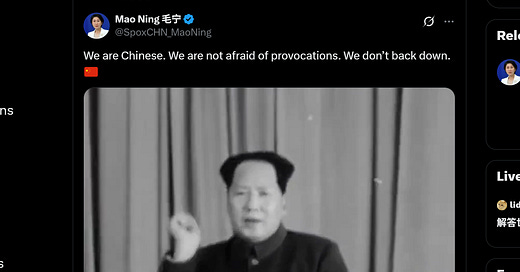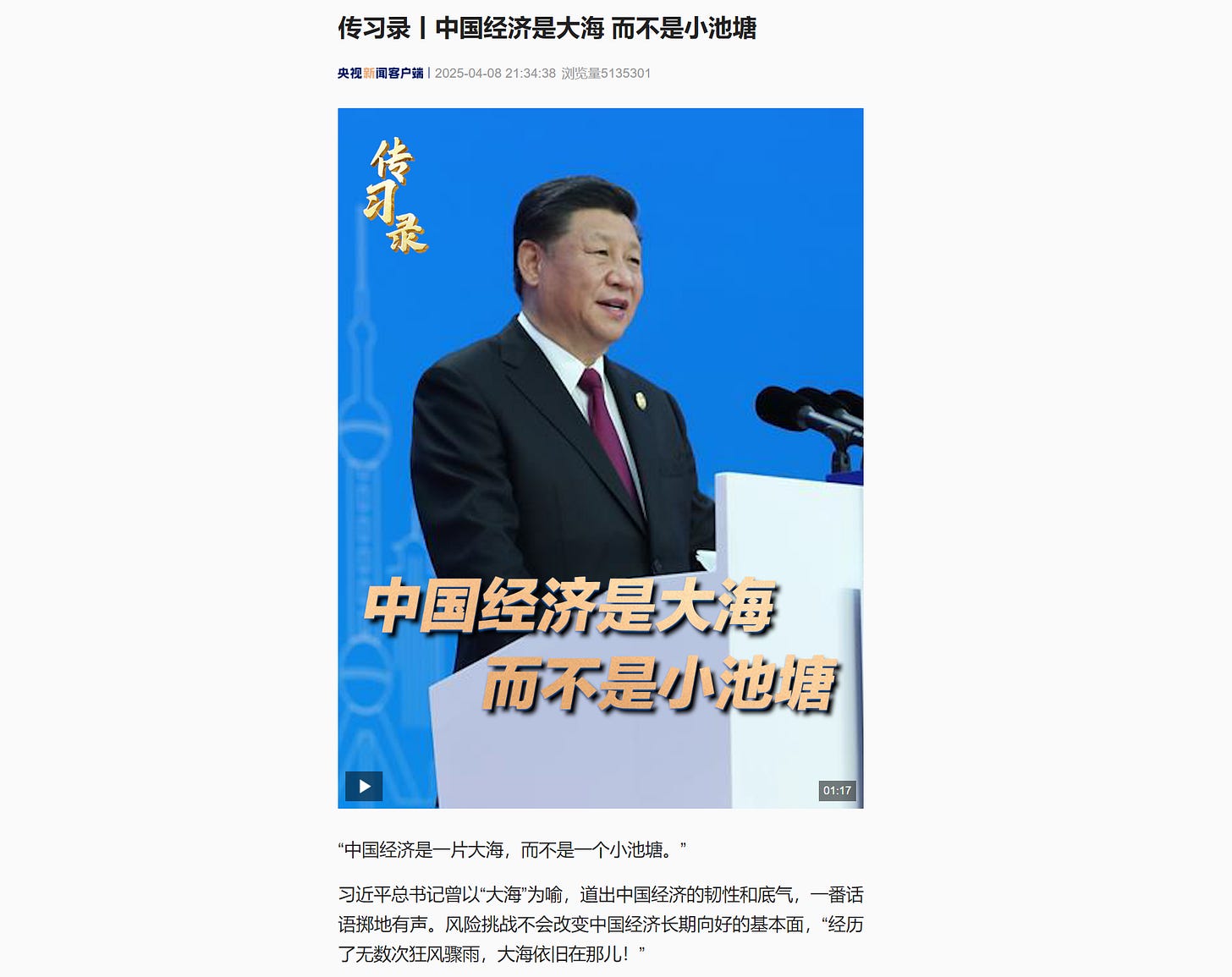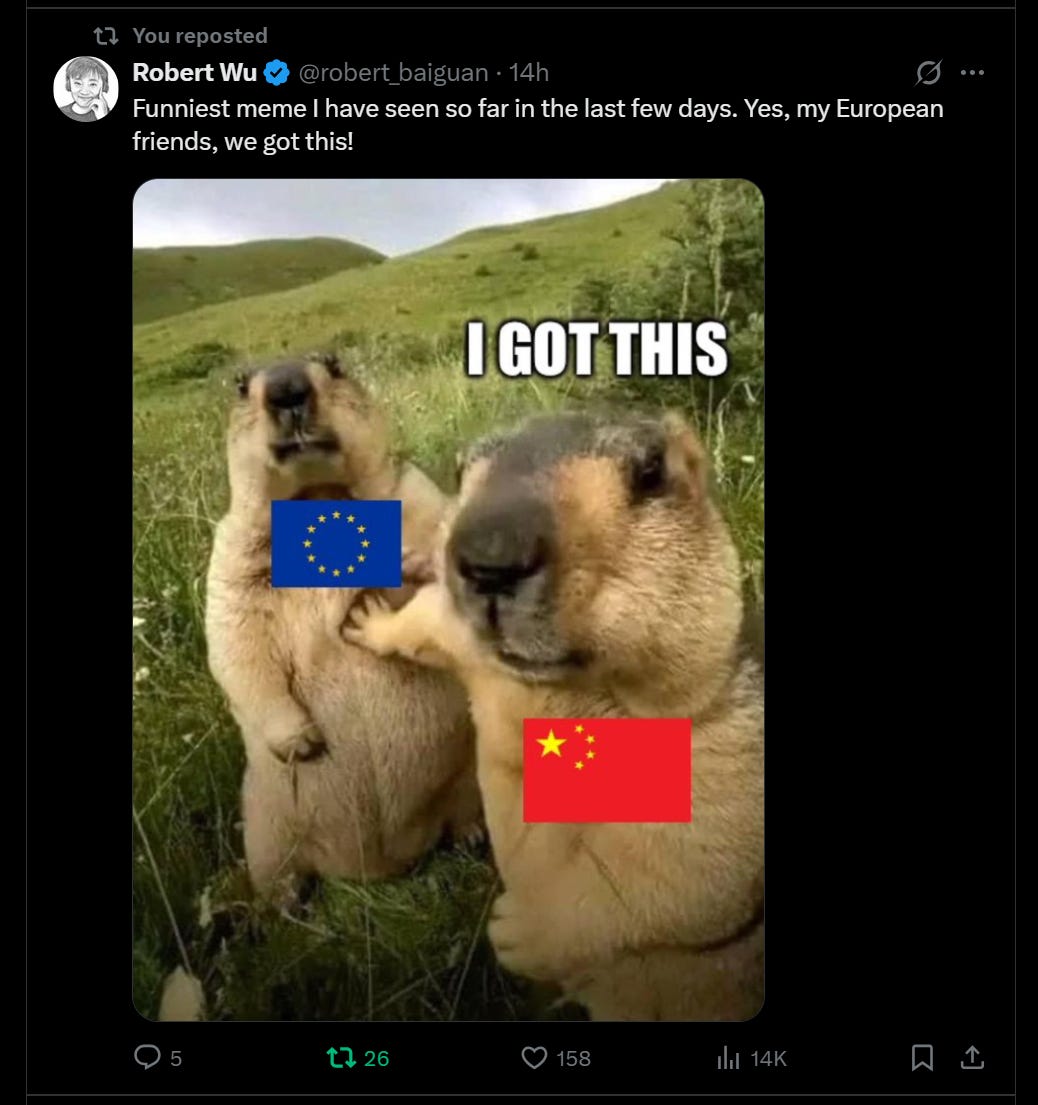"We'll never yield": Chinese foreign ministry invokes Chairman Mao in response to U.S. tariff bullying
China has taken swift, firm countermeasures following the U.S. tariff hike on Chinese imports, in a move to safeguard its legitimate rights and interests.
“We are Chinese. We are not afraid of provocations. We don’t back down, ” tweeted Chinese Foreign Ministry spokesperson Mao Ning on Thursday.
Accompanying the tweet was a video featuring excerpts from Chairman Mao Zedong's speech on "the War to Resist U.S. Aggression and Aid Korea (1950-1953)."
The following is the content of Mao Zedong's speech featured in the video released by Mao Ning.
"时间要打多久,我想我们不要做决定。过去是由杜鲁门,以后是艾森豪威尔,或者美国的将来的什么总统,由他们去决定。他们要打多久就打多久。一直打到完全胜利。"
"We are not the ones who can decide. It used to depend on President Truman and it will depend on President Eisenhower or whoever to become the next U.S. president. It's up to them. No matter how long this war is going to last, we'll never yield. We'll fight until we completely triumph."
Clearly, Mao Ning's tweet responds to the U.S. government's latest policy on tariffs. On Wednesday, U.S. President Donald Trump said that he was pausing his new tariffs for 90 days except on China, which he announced he will raise to 125 percent.
Trump announces 90-day pause on tariffs except on China -- China Daily
Trump posted: "Based on the lack of respect that China has shown to the World's Markets, I am hereby raising the Tariff charged to China by the United States of America to 125%, effective immediately."
The U.S. has significantly escalated tariffs on Chinese goods in recent years. From an average of 19-20 percent in 2018 and 2019, the rate increased by 20 percent earlier this year, followed by an additional 34 percent in April, bringing the current cumulative total to approximately 74 percent. With the latest 50 percent hike, the total burden could reach 124 percent.
Prior to Trump's announcement, China had already implemented swift and firm countermeasures in response to the U.S. tariff hike on Chinese imports, aiming to protect its legitimate rights and interests, according to Xinhua News Agency.
The Chinese government on Wednesday announced that it will raise additional tariffs on products imported from the United States to 84 percent, add six U.S. firms to its unreliable entity list, and place 12 U.S. entities on its export control list.
In response to Trump's latest tariff policy, there is widespread attention both domestically and internationally on how China will react. As seen from Mao Ning's Thursday tweet, China will not back down.
Whether China's economy can sustain itself under these circumstances is also a focal point of concern for many. On Tuesday, a WeChat blog operated by the state-run China Media Group posted a piece quoting Chinese President Xi Jinping's words, saying "中国经济是大海,而不是一个小池塘 the Chinese economy is not a pond, but an ocean. "
The post highlighted that Xi has likened the Chinese economy to "the ocean," emphasizing its resilience and solid foundation with a powerful statement. The risks and challenges will not alter the fundamentally positive long-term prospects of China's economy. "经历了无数次狂风骤雨,大海依旧在那儿! After countless storms, the ocean is still there!"
This blog post undoubtedly also displays China's stance towards the U.S. tariff increases and conveys to both the Chinese society and the international community the confidence in handling the tariff challenge.
One the same day, Chinese Premier Li Qiang said in a phone conversation with European Commission President Ursula von der Leyen that China is ready to work with the European side to promote the sound and steady development of China-EU relations.
I have to admit, “X” still has some gems—like this hilarious meme about China and Europe dealing with U.S. tariff wars:
Meanwhile, a witty observation is recirculating on the Chinese internet, playing on a clever wordplay in Chinese:
今后世界上可能会出现两大阵营:一个以北京为核心,强调自由贸易、技术革新,人称北约。一个以华盛顿为核心,对外无限抬高贸易壁垒、封闭市场,对内由主导国家人为安排产业链分工,人称华约。
The Chinese character “北” (běi) appears in both “北京” (Beijing) and “北约” (NATO), just as “华” (huá) is shared by “华盛顿” (Washington) and “华约” (Warsaw Pact). Given the contrasting policy directions of the Chinese and U.S. governments in recent years, netizens have humorously speculated that the world might soon see two new different blocs:
A “NATO” (北京版 / Beijing Edition): Centered around Beijing, championing free trade and technological innovation.
A “Warsaw Pact” (华盛顿版 / Washington Edition): Led by Washington, defined by sky-high trade barriers, market isolation, and state-directed supply chain reshuffling.
The jab inverts Cold War-era alliances to mock perceived U.S. protectionism while framing China as the new standard-bearer of economic globalization.
For more details on China's position regarding China-U.S. economic and trade relations, you can download the white paper here released by China's State Council Information Office on Wednesday.
For readers still following the Taiwan issue, I recently published an excerpt from Chinese mainland’s first English-language academic journal dedicated to Taiwan-related research for an international audience on my Substack. I’ve also shared selected past content—if you’re interested, click the link below to read and download the full publication.







